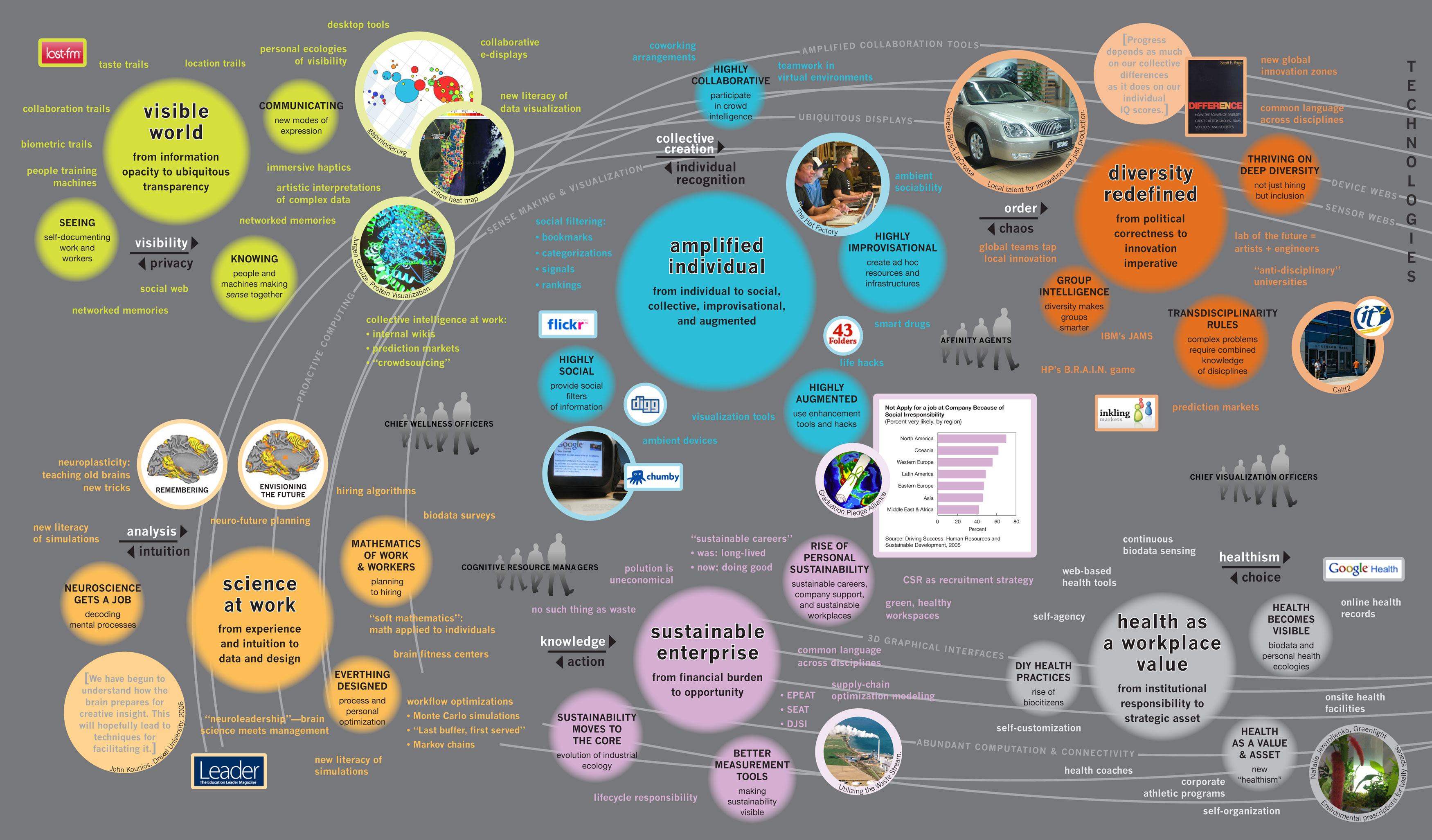How has technology changed
work?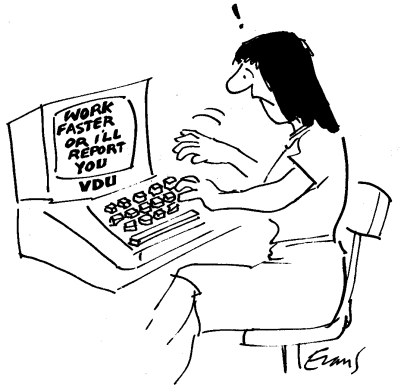
Yes, the use of technology makes our production more labor-efficient, but does it make our work experience worse?
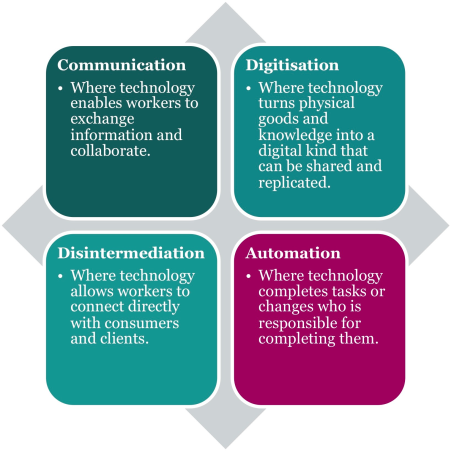
Technology has made work less physically strenuous and more
efficient, but not necessarily less.
The hope that technology would give us lives of leisure has not come true.
The fear that technology will result in not enough jobs for people has not come true.
long term trends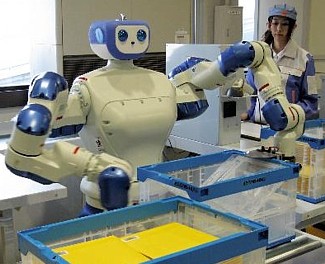
19th & 20th century pattern: technology makes possible more and more mass production
technological innovation tends to mean:
has it taken away jobs and left us with mass unemployment--no (at least so far)
has it changed work for the worse as well as for the better--yes
October 1920 cover
 In the 1890s, conditions for American workers
were particularly bad
In the 1890s, conditions for American workers
were particularly bad

spinning in Georgia
Society has sometimes looked to engineers for efficiency--make human life more rational with the idea that this will make progress possible. Efficiency tends to become the goal.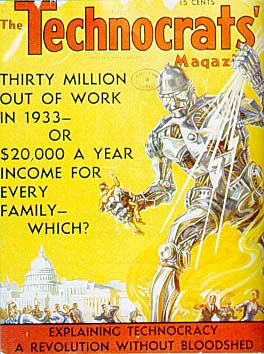

- it may make work easier and/or save time
- less craftsmanship needed in many cases
- work can be very boring, repetitive, not much satisfaction in work--assembly line
- Charlie Chaplin factory scene in Modern
Times
- in other areas technology takes over the boring part of the job--engineering calculations
- engineers no longer need hand drafting skills
- technologies may create new kinds of jobs
- many professionals do their own typing instead of having a secretary
- teachers and doctors have to deal with students/patients finding lots of random information
Yes, the use of technology makes our production more labor-efficient, but does it make our work experience worse?
- increased productivity in agriculture is one measure of how technological progress makes us richer--for each person employed in agriculture our technological agriculture produces enough food to feed more and more people.
- factories make more at lower cost and with fewer workers
- by 1920 many workers could afford consumer goods made cheap by mass production, including automobiles
- in the 1950s predictions were common that by the end of the century people would work less than 30 hours a week and have more vacation time and be able to retire younger. This was a prediction that existing trends would continue. Technology would continue to take away the burden of work
- be careful when talking about efficiency: do you mean
labor efficiency or time efficiency or cost efficiency?

- reduced how labor-intensive manufacturing is
- you can get more done in the same amount of time--productivity
- we are expected to do more in a day
- Increased stress because we are doing more--expectations grow even faster than efficiency
- jobs that used to be done by different people get lumped into one job
- work has become less strenuous and less dangerous (regulation helped with that)
- some work is less mundane, computers do the boring parts
- technology allows us to do more complicated things
- does technology give us more free time?
- robot vacuum cleaner
- typewriter to computer saved a lot of time, but
whose?
- washing machines and dryers
- but we usually use freed up time to do more (higher
standards), not for leisure
- work day shortened from 12+ to 8 hours from late 19th
century to 1920s, but that pattern seems to have ended
- concern about technological unemployment--machines replacing people--some saw the solution as a shorter work day
- concern strong in the 1930s and the 1970s
- there are certainly places where humans have been replaced by machines
- does that just mean more jobs with the new
technology?
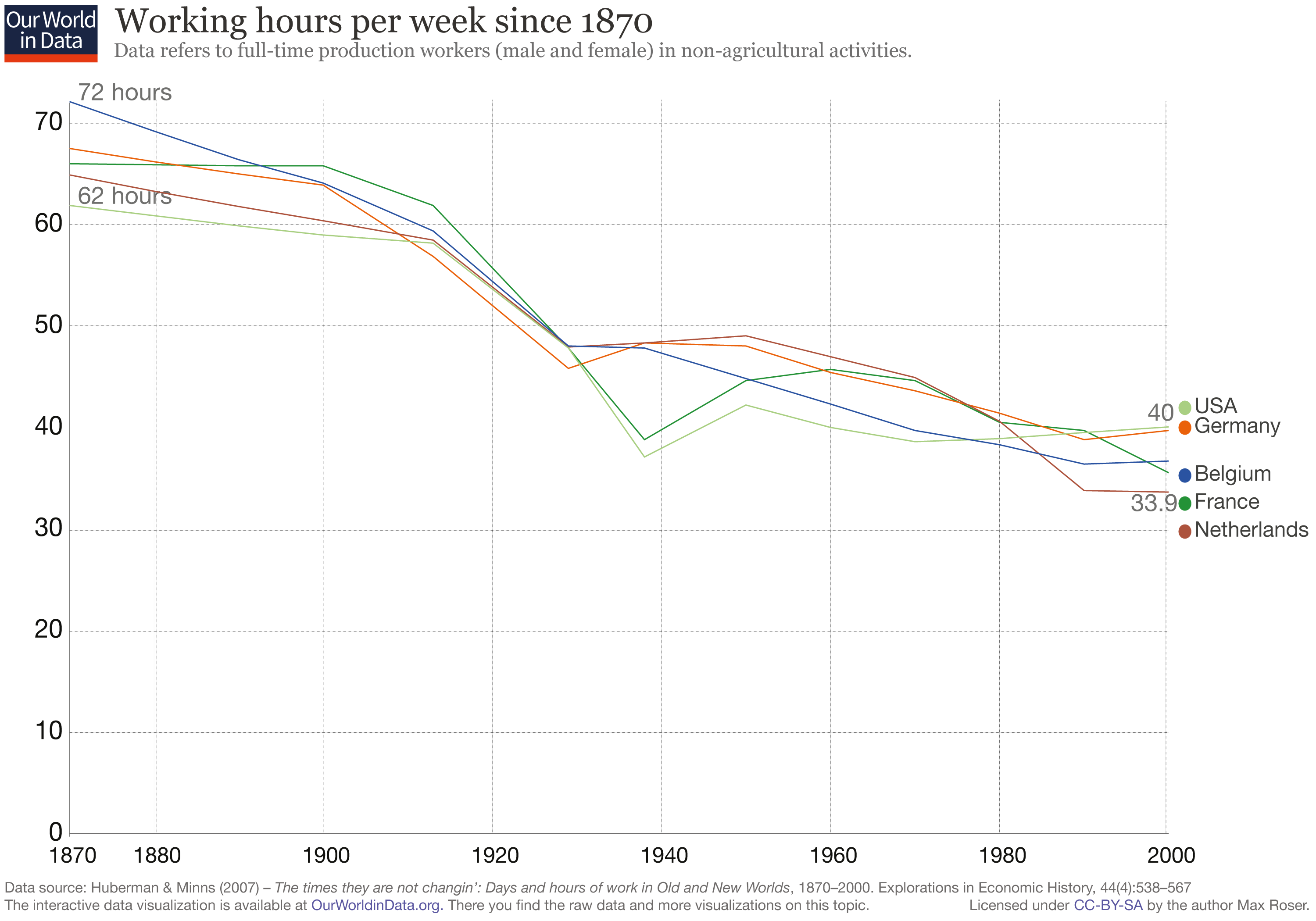
- people who lose jobs don't usually have skills for the new jobs
- not as many jobs to do the same job
- technology creates jobs in whole new industries
- technology has tended to create more jobs than it has eliminated
- these days people are expected to do more work for the same pay (often with the help of technology)
- more products and more things to do mean we don't work less
Key issues:
- changes in work involve a lot of choices made by
society (more leisure time or higher standards is a
choice)
- key effect of technology is increasing labor-efficiency: one person can do more in the same amount of time
- who benefits: lower prices, higher wages, shorter work week, or higher profits
- what is the balance of technology replacing some jobs but creating new jobs
- how satisfying is the work? do consumers value creativity?
- technology has given us the ability to have more
things, but with more uniformity, less creativity
The hope that technology would give us lives of leisure has not come true.
The fear that technology will result in not enough jobs for people has not come true.
- some people argue this time is different
because more kinds of jobs are being affected
long term trends

- mass production makes goods cheaper, people can have more things
- production work has become less satisfying if jobs
exist at all
- technology made production so efficient that wages increased into the 1990s
- replaced in part by low wage service jobs
- people are realizing their standard of living is no
longer increasing as much as a result of technology
- during the pandemic (after the shutdowns ended) some people decided they were not willing to work unless it got them a better life
- no point working if you can't make enough to pay for child care
- workers are beginning to insist that the system has
to change--either via unions or by just not taking jobs
19th & 20th century pattern: technology makes possible more and more mass production
- products cost less, more people can buy them
- but mass production also makes the experience of work very different
- takes away the possibility for most people of quality
and uniqueness
- assembly line work is boring and repetitive
- mass production takes away the ability to have pride in your work
- craft work is personal
- only in the first case is there an opportunity to be
creative
- mass production means fewer people are needed to make the same number of guns, need less training
- lower cost guns, more people can afford them
- when making the most for the least money is the goal
then quality tends to suffer
technological innovation tends to mean:
- these days outsourcing is often cheaper than robots
- unemployment for some people whose skills are no
longer needed
- monotonous, low wage work for others
- workers on an assembly line felt they were turned
into machines
- high wages for a few whose skills are still needed
- number of new jobs has kept up fairly well with the
number of jobs lost, but may need qualifications older
workers lack
- overall there are more good jobs, but often ones for which the people who lose their jobs are unqualified
has it taken away jobs and left us with mass unemployment--no (at least so far)
has it changed work for the worse as well as for the better--yes
October 1920 cover

- technology was making workers more replaceable--skill
was being built into the machines
- immigration meant there was a surplus of workers
- child
labor was widely used (photos)
-

spinning in Georgia
- demands for reform began with the progressive
movement--the government should protect workers and
consumers
- But then low unemployment during World War I (1.4%) meant that workers got what they wanted without radical fights--by 1919 almost 50% of workers had 8 hour day
- labor unrest was an important part of the
story
- the goal was to organize all workers into one big union, not divided by skill or industry or class or race. Earlier trade unions had been by skill, but skill meant less and less.
- "Trade lines have been swallowed up in a common servitude of all workers to the machines they tend."
- wanted control of the factory by the worker but they were anarchists (no government) more than Marxists. They did want to do away with capitalism and abolish the wage system. They did not advocate violence but workers fought back when attacked.
- message to workers: why should the fat
cats get rich off you? Wanted workers to share
in
profits. When a factory makes a profit because
technology increases efficiency why is it the stockholders
who get all the profit (above and beyond a reasonable
return on their investment)? Why don't the workers
get a share? Remember the story of Ford as an
exception to this pattern.
- leaders-- Emma
Goldman, Big
Bill
Haywood, Elizabeth
Gurley Flynn, Joe
Hill --traveled around helping organize and giving
speeches to encourage strikers.
- This often turned into a fight over the right of free speech (source). In several places (eg. mining camps in Montana and lumber towns in Washington state) laws were passed prohibiting union meetings or street meetings and people who gave pro-union speeches were arrested. The IWW would send in more and more speakers until the jail couldn't hold any more. (Joe Hill song)
- Some leaders advocated sabotage.
- they mostly meant soldiering--work slowdowns
- creative techniques like the open mouth strike--follow every rule to the letter and work slows down
- in 1912 the IWW supported a successful strike of textile workers in Lawrence, Mass.
- immigration had already been reduced
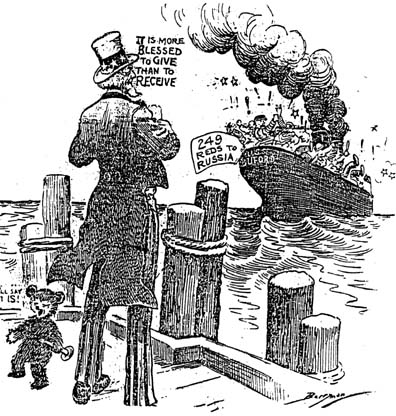
- IWW opposed the war as only for the benefit of the rich
- IWW leaders were accused of treason and executed or deported (most were immigrants who did not have American citizenship)
-
- but wages went up and working hours down during WW I--low unemployment (1.4%) meant that workers got what they wanted without radical fights
- By 1919 almost 50% of workers had 8 hour day, wages went up, often to a family wage (the husband can work and make enough money to support his wife and children)
- this is where we went to a system where workers also saw the benefits of the capitalist system--they now had some leisure time and they had wages high enough to be able to buy more things
- by 1920 many workers could afford consumer goods made cheap by mass production, including automobiles
- in the 1950s predictions were common that by the end of the century people would work less than 30 hours a week and have more vacation time and be able to retire younger. This was a prediction that existing trends would continue. Technology would continue to take away the burden of work
Society has sometimes looked to engineers for efficiency--make human life more rational with the idea that this will make progress possible. Efficiency tends to become the goal.

- scientific management sought to rationalize worker behavior
- home economics sought to bring rationalization to the home
- On a larger scale this became the
technocracy movement
- Engineers in the 1920s thought that what government needed is more efficiency and that government should be run more by engineers and other technical experts and less by politicians (engineering progressivism). We have indeed gone in this direction. (The best book on this is Walter McDougall, ...the Heavens and the Earth: A Political History of the Space Age)
- In 1932, in the height of the depression, there was a lot of talk about Technocracy--a movement whose leaders proposed to end the depression by a dictatorship of engineers. Present day members of Technocracy Inc. say this description is an exaggeration, but the rhetoric at the time came close.
- An alternate view: "The most powerful supporters of stasis are technocrats - people, often in position of power, who believe that the future can and should be engineered." Technocracy RIP
Why haven't we seen robots
replacing workers as much as expected?
Will technological advancements replace manual labor?
- we thought that machines would give us a life of
leisure
- some simple jobs are hard for a robot to do because it is hard to program a robot to adjust to small variations
- workers are often cheaper than robots--would it be worthwhile for McDonalds to replace all its workers with robots?
- workers are particularly cheaper in other
countries--eg. outsourcing of computer programming to
India
- we may say we want to interact with people, but there wasn't much resistance to the replacement of bank tellers with machines
- computerization gave workers more information rather than taking away control
- hours worked per year has actually been
increasing since 1970, not continuing to decrease
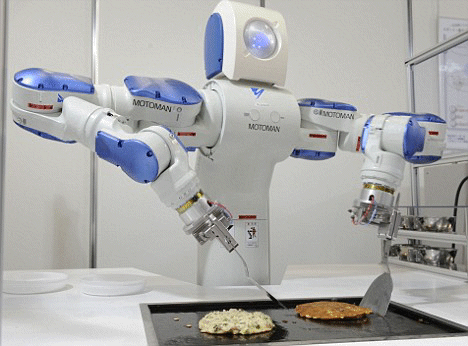
- efficiency has tended to mean fewer workers are expected to do more (this is true of professionals as well as factory workers)
- technology gives us more and more things to buy
- would you rather work longer hours or make less money?
- driverless trucks could replace a key set of jobs
- expert systems can replace work that requires thought
- computers are now better than radiologists in finding cancer on images
- jobs where machines will never replace people?
- jobs where human interaction is crucial
- jobs that require creativity (computer can learn, they can discover patterns and follow them, they can do trial and error very quickly, but they don't have the highest level of creativity)
- politics--see notes above on technocracy
- blue collar problem solving jobs like plumbers
- why would you? the choices made by businesses depend on what makes more money
- what directions could this go in?
- we could make a greater commitment to protect jobs, maybe by encouraging labor unions
- change could be gradual enough, wages low enough, immigration restricted enough that there continue to be enough jobs, but many would be bad jobs
- tax the robots (value added tax), pay a
universal basic income, allow people to pursue
creative pursuits that don't pay if they are willing
to live very simply
Will technological advancements replace manual labor?
- is the machine cheaper
- are there skills that are hard to program into a machine
- will people value doing the work or a hand made product
Will technological advancements replace
cognitive labor? Will jobs that require higher education
be replaced by artificial intelligence?
1st - Technology is
neither good nor bad; nor is it neutral.
2nd - Invention is the mother of necessity.
3rd - Technology comes in packages, big and small.
4th - Although technology might be a prime element in many public issues, nontechnical factors take precedence in technology-policy decisions.
5th - All history is relevant, but the history of technology is the most relevant.
6th - Technology is a very human activity - and so is the history of technology.
2nd - Invention is the mother of necessity.
3rd - Technology comes in packages, big and small.
4th - Although technology might be a prime element in many public issues, nontechnical factors take precedence in technology-policy decisions.
5th - All history is relevant, but the history of technology is the most relevant.
6th - Technology is a very human activity - and so is the history of technology.

